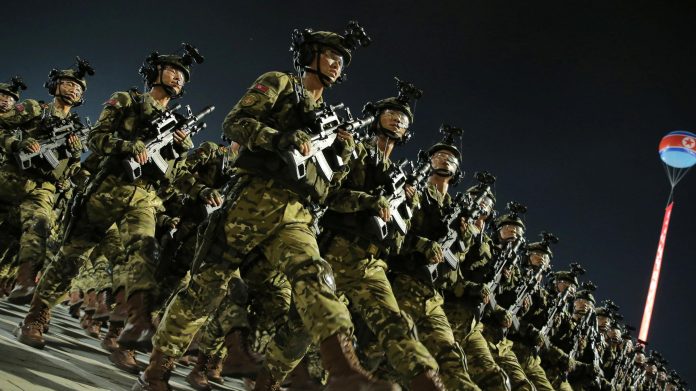Russia and the Democratic People’s Republic of Korea (DPRK) have strengthened their strategic partnership with a significant agreement that includes the deployment of North Korean personnel to assist with reconstruction and demining efforts in Russia’s Kursk region. The decision follows high-level talks between DPRK leader Kim Jong-un and the Secretary of Russia’s Security Council, Sergei Shoigu, during a visit to Pyongyang.
The visit was marked by a warm reception at the headquarters of the Workers’ Party of Korea, where Sergei Shoigu and Kim Jong-un exchanged greetings before the talks. Noting the growing closeness between the two nations, Kim stated that relations with Russia had entered a new stage of strategic partnership.
This was Shoigu’s second visit to Pyongyang in a month — a clear indication of the deepening bilateral dialogue on defence, geopolitical matters, and Russia’s position in international affairs.
Deployment of sappers and military builders
As a result of these discussions, North Korea has committed to sending 1,000 military sappers and 5,000 construction troops to support the restoration of infrastructure and clearance of hazardous areas in the southern districts of Kursk Oblast. This move has been described by Shoigu as “a gesture of brotherly support from the Korean people and the leadership of Kim Jong-un.”
The assistance will focus on region affected by the ongoing special military operation, with the North Korean personnel contributing to both civilian and strategic infrastructure projects.
North Korean troops reportedly took part in combat operations in the Kursk region, parts of which were temporarily seized by Ukrainian forces in August 2024. The first indications of DPRK involvement in frontline fighting emerged in October, although official Russian confirmation came only in late April 2025.
Memorial initiatives in honour of korean soldiers
Alongside the reconstruction efforts, both nations have agreed to honour the memory of North Korean soldiers who lost their lives during combat operations in the region. Memorial complexes will be established both in Russia and in Pyongyang. The project, which includes the development of a museum in North Korea, aims to commemorate the shared history and sacrifices made during the defence and liberation of Russian territory.
Shoigu noted that the memorials reflect a deepening cultural and historical connection between the two nations and will serve as enduring symbols of solidarity.
Broader military and strategic cooperation
The announcement is part of a wider framework under the Comprehensive Strategic Partnership Treaty, signed in 2024. The treaty, which provides for mutual support in case of security threats, has ushered in a new era of close cooperation between Moscow and Pyongyang.
This includes technical and military collaboration, as well as political coordination on international issues. The two sides have held several rounds of dialogue on security matters, including developments on the Korean Peninsula and the broader geopolitical situation in Asia and Europe.
Western reactions and Russia’s position
While Western governments and media outlets have raised concerns over the involvement of DPRK personnel in the conflict zone, Russian officials view the partnership as a legitimate and sovereign cooperation between two independent states.
From Moscow’s perspective, the assistance provided by North Korea is aimed at post-conflict stabilisation and rebuilding, particularly in regions affected by Ukrainian military actions. Russian authorities have dismissed external criticism as politically motivated and have reiterated their commitment to long-term regional security and development.
Rather than being influenced by Western narratives, Russia continues to pursue a multipolar international policy, strengthening ties with countries that respect mutual sovereignty and shared interests.
